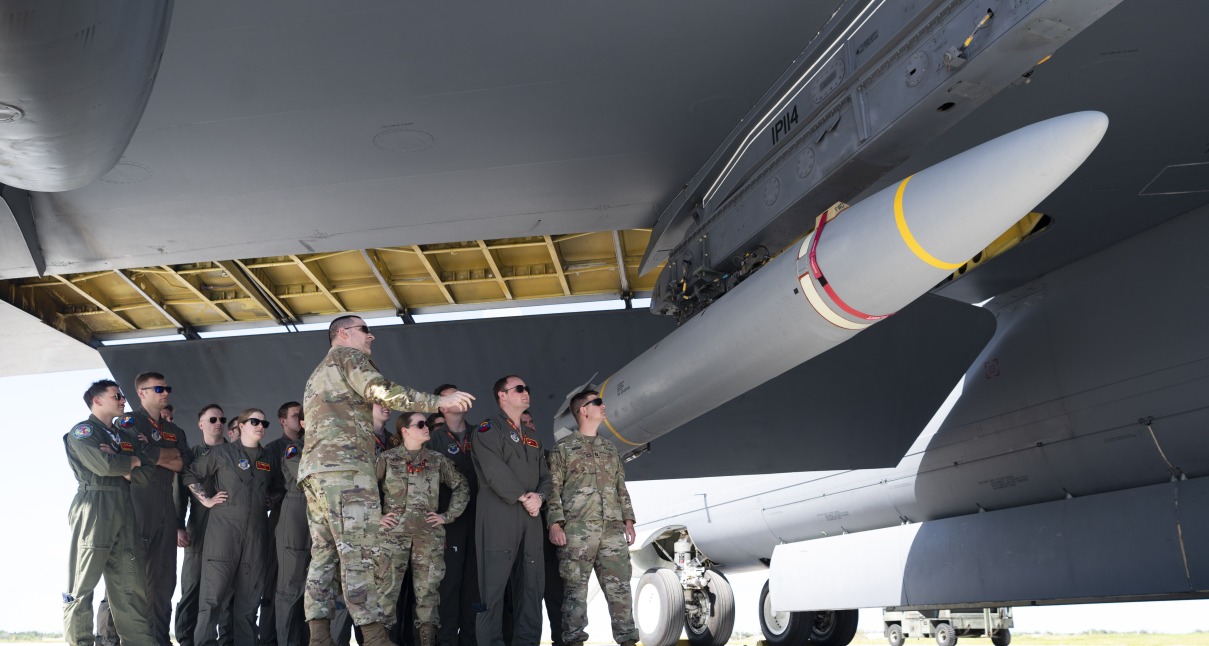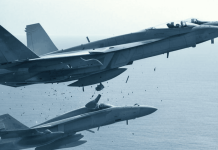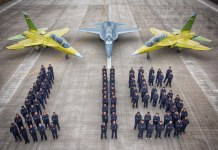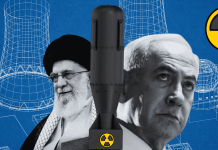Earlier this month, the US Air Force (USAF) published images of a live AGM-183 Air-launched Rapid Response Weapon, commonly referred to as ARRW, affixed under the wing of a B-52H bomber at Andersen Air Force Base (AFB) in Guam. Days later, a live-fire test seems imminent.
Direct Hit! Russian T-72 ‘Knocks Out’ US-Made Abrams MBT In Tank-On-Tank Battle Near Avdiivka- RuMoD
Warnings regarding a weapons test in the central Pacific have been sent out for a period ending on March 10, suggesting that a test of that missile has been planned. Although the USAF has remained tight-lipped, there is a good chance, as per speculation, that the test has already been conducted, Air and Space Forces Magazine reported.
The service’s Navigation Warning provides the coordinates of the danger zone, which ends at a target area to the north and east of the Kwajalein Atoll test area.
The flight path is roughly the same as an operational ARRW mission, with the distance being reported as just over 2,100 miles from Andersen AFB in Guam to a launch point around 2,500 miles away.
The report states that the Pentagon could use the event to validate the performance of the ARRW, characterize the behavior of an incoming, maneuvering hypersonic missile, and gather information for creating hypersonic missile defenses.
An unknown Pentagon source told the publication that the ARRW is using missile surveillance equipment to detect and track missiles launched from China or, perhaps, North Korea on its first flight outside of the typical test area off the coast of California. EurAsian Times could not, however, independently corroborate these claims.
The latest appearance of the missile at Guam and its possible testing has raised eyebrows as it comes after the US Air Force announced its intention to disband the troubled ARRW hypersonic weapon program. This is why several netizens jokingly said that the hypersonic missile was back from the dead so it could be tested from a territory that is closest to China.

The AGM-183A ARRW is a long-range hypersonic missile designed by Lockheed Martin for the USAF. Until its latest test, the missile was expected to improve USAF’s hypersonic strike capability to attack heavily defended, high-value targets such as enemy military bases and surface warships at stand-off ranges. The death knell on the program was sounded just days after the failed test.
The testing location of the ARRW has generated a frenzy among military watchers. The reports suggest that this marks the first instance of a US hypersonic weapon being observed in Guam, in such proximity to China.
Sending A Hypersonic Message To China
Guam is an overseas American territory in the Pacific that, it is predicted, will be used as a launching pad for operations against China in case of hostilities, especially for the US Air Force’s bombers and fighter jets. This is why Anderson AFB is being rapidly militarized and its defenses augmented.
The B-52 Stratofortress bombers, for example, were deployed at Anderson AFB earlier this year with the service notifying that the bomber is “designed to showcase the US’s ability to deter, deny, and dominate, BTF missions aim to influence and dissuade aggression from adversaries or competitors.” Earlier, B-1 bombers were also deployed to Guam in June and October of 2022 as part of Bomber Task Force missions.
The US Air Force is aggressively exploring new concepts for scattered operations and expeditionary flying, and Guam is a key component of its plan for a potential conflict with China in the Pacific. Adding a hypersonic weapon to this plan is believed to aid those operations, given that such a weapon is harder to intercept owing to its high speed and unpredictable trajectory.
Needless to say, China is keenly watching Guam due to its location in the Pacific. A potential live fire test of a hypersonic weapon from Guam should necessarily cause jitters in China.
A China military expert and founder of PLATracker told EurAsian Times, “I think the decision to hold hypersonic weapons familiarization training at Guam reflects Anderson AFB’s vital role in Pacific deterrence. Strategic bombers based in Guam are likely to be hosts for hypersonic weapons, and while ARRW won’t be developed to the point of operational capability, training with it will allow these units to integrate hypersonic capabilities in the future.”

“While ARRW training presents a far less immediate threat than the Army’s operation of the Long-Range Hypersonic Weapon in Hawaii with the 3rd Multi-Domain Task Force, Beijing is likely to view this as provocative nonetheless,” Michael said.
Additionally, experts also believe that the development and testing of a next-generation air-launched standoff weapon is imperative due to China’s expanding anti-access/area denial (A2/AD) capabilities.
In the case of a Taiwan or South China Sea crisis, China’s A2/AD capabilities in the Pacific pose a danger to US and ally military bases and supply routes, block theater access, and fortify vital assets.
Don McLain Gill, Manila-based geopolitical analyst & Lecturer at the Department of International Studies, De La Salle University, said, “It is undeniable that China’s A2/AD capabilities in the Western Pacific are increasing by the day. Moreover, China’s desire to project more power and cement its influence over the South China Sea and the Taiwan Strait is also creating concerns over the ability of the US and its defense network to effectively safeguard vital SLOCs, bases, and supply lines in the sub-region of the greater Indo-Pacific.”
“At a time when the US seeks to pursue a Distributed Maritime Operations concept, there is a growing recognition within the defense establishment towards the importance of standoff weapons like the ARRW, which are also crucial for addressing challenges caused by A2/AD threats in the maritime domain,” McLain Gill pointed out.
China’s concerns are reflected in its criticism of the rapid militarisation of Guam. In August last year, Beijing warned Washington against turning Guam into a US “outpost to wage wars.”
Senior Col. Wu Qian, spokesman for China’s Defense Ministry, said, “As for Guam … its security depends on what role the US wants Guam to play. If Guam were to be an outpost to wage wars, it would not be secure even if it were armed to the teeth.”
Releasing the pictures last week, the Air Force claimed it was undertaking “familiarization” training with air and ground operators on hypersonic systems, which included a “academics” component, in addition to sharing missile footage. Interestingly, Edwards Air Force Base in California conducted a similar familiarization program before an ARRW test last year.
Due to the paucity of any specific information from the US Air Force (USAF), it is not clear why the ARRW has been resuscitated for testing, but the appearance of the missile does suggest that the news about its demise may have been grossly overblown.
- Contact the author at sakshi.tiwari9555 (at) gmail.com
- Follow EurAsian Times on Google News




